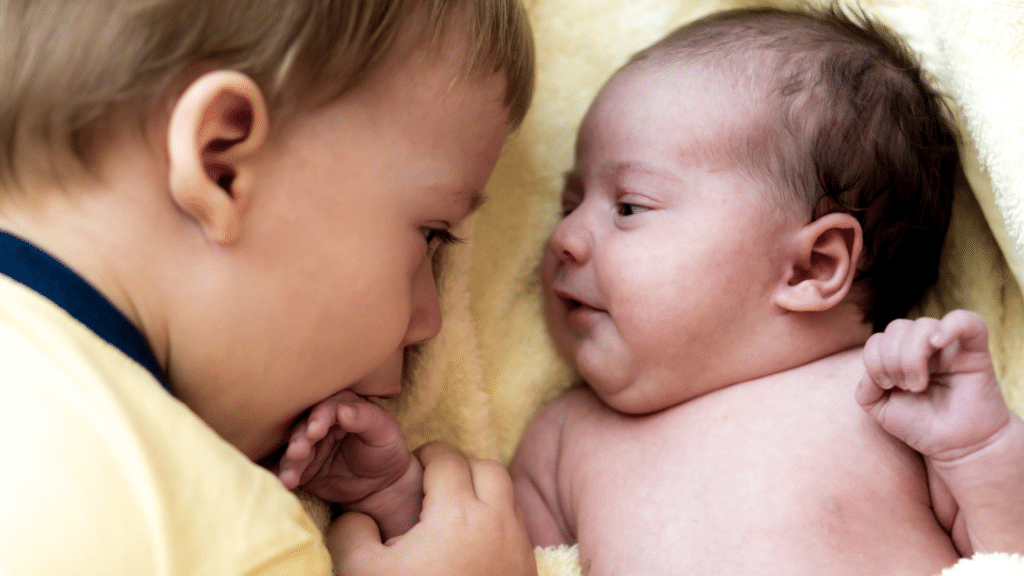Welcoming a new family member is meaningful and exciting for every family. Yet, it presents unique challenges in maintaining a healthy and positive atmosphere for siblings already in the family. As this significant transition unfolds, children’s emotions can range from excitement and pride to jealousy and worry. Addressing these emotions and helping siblings adapt to the changes that come with a new addition is crucial for maintaining strong family bonds and creating a nurturing environment for everyone involved.
In this blog, we will explore the different aspects of preparing siblings for the arrival of a new family member, from understanding the emotional impact of a new baby on siblings to effective communication techniques. We will also discuss ways to involve siblings in the pregnancy journey and prepare them to adapt to household dynamics and routine changes. Furthermore, we will highlight the importance of using age-appropriate literature to assist children in navigating this challenging but rewarding period in their lives. The goal is to provide parents and guardians with valuable insights and practical suggestions to make the transition smoother and more enjoyable for the entire family.

Understanding the Impact of a New Baby on Siblings
The arrival of a new baby is a momentous occasion filled with joy and excitement for the entire family. However, it’s essential to consider the feelings and experiences of siblings when a new brother arrives, as their worlds are also about to change drastically.
Children can express a broad range of emotions when they learn they will become big brothers or sisters. These emotions can sway from jubilation and pride to worry and even jealousy. Particularly, when the baby brother is about to arrive, it’s not uncommon for siblings to feel a multitude of feelings jointly or even swing from elation to dismay confusingly quickly. Enthusiasm about having a new playmate could be overshadowed by fear of sharing parental attention, or wonder at having a cute baby sibling can sit alongside worry about how the family dynamics will change.
These feelings are normal and reflect the significant transition the child will experience upon the arrival of their new brother. Parents should neither dismiss these mixed feelings nor deem them singularly negative but instead, recognize and validate them to help the child navigate this emotional labyrinth.
Common reactions to a new family member’s news can also vary widely. Some children might become clingy or regress in behavior, such as asking for a pacifier after giving it up years ago. Some kids might voice worries explicitly, while others might express them through actions, like being unusually naughty, reacting differently to familiar situations, or sleeping poorly. Again, when the arrival of a baby brother is imminent, letting your children know their feelings are heard and acknowledged is essential.
The role of age and development in these sibling reactions cannot be overstated either. Younger children, for example, might have a more challenging time understanding the concept of time and may become frustrated when the baby doesn’t arrive immediately after the announcement. On the other hand, older children may be better equipped to understand the concept of a new brother but might have more concerns about how this change will affect their daily lives.
Similarly, children at varying developmental stages may raise different types of questions about the baby, with younger kids asking more about practical matters (e.g., where the baby brother will sleep) and older kids showing curiosity about deeper issues (e.g., how families grow, and why babies need so much care). By understanding and addressing these nuances, parents can more effectively guide their children through this transition, converting a potentially overwhelming event into an enriching family experience when adding a new brother.
In this journey, patience and open communication are invaluable resources, making the path smoother and more comfortable for everyone involved in welcoming the new brother.

Communicating the Arrival of the New Baby
Communicating the new baby brother’s arrival is a helpful guide outlining how to engage in open, thoughtful discussions with the family about a new addition. It provides parents with tips to ensure existing siblings, particularly the young child, feel involved and offers advice on effectively handling their questions, promoting a nurturing and inclusive environment.
Importance of Open Communication
Maintaining an open line of communication leading up to one of your family’s most significant moments – the arrival of a new baby brother is essential and beneficial. Informing your loved ones about the pending new addition generates excitement and paves the way for support and understanding. Particularly for the young child, it’s an important step in helping them adjust to the significant change.
Open communication can also help alleviate anxiety or uncertainty for the young child, promoting a safe and inclusive atmosphere surrounding the birth. During this beautiful time, everyone should feel involved and connected.
How to Announce the Arrival to the Siblings
Revealing the impending arrival of a baby brother is an incredible moment. It is essential to communicate this news sensitively and thoughtfully, especially to the young child, as it could significantly affect their emotional well-being.
When announcing the news, consider approaching the subject gently and in an environment where the young child feels secure. Use words they understand and encourage them to express their feelings and thoughts. Making them an integral part of the journey can help to cultivate excitement rather than resentment or fear.
Depending on your young child’s understanding, you might stagger information. For instance, very young children tend to have a poor grasp of time, so you might want to wait until you’re visibly showing before telling them.
Remember, every child is different. Some may react with delight, while others may show signs of apprehension. Give it some time and encourage your young child to process the information in their way.
Answering Questions about the New Baby Brother
When you announce a new baby brother, be ready for many questions from the young child. These could range from innocent inquiries like “Where do babies come from?” to emotional ones like “Will you still love me the same?”.
Answering these questions honestly (in an age-appropriate manner) and promoting open discussions can help your young child adjust better to having a sibling. It reassures them that they can still trust and rely on you even though changes are happening.
Remember, changes can be challenging, especially for a young child. The key is to maintain a positive environment where everyone feels they are essential to the upcoming changes and celebrations.

Involving Siblings in the New Brother or Sister’s Pregnancy Journey
This piece underscores the importance of including siblings in the preparations and experiences before a new brother or sister’s arrival. Practical suggestions include setting up the nursery, attending ultrasound appointments, and picking out baby clothes. Further, it delves into the roles siblings can assume once the baby arrives, nurturing a sense of unity, and easing the transition for the entire family.
Involving Siblings in Preparations
Involving siblings in the preparation for a new brother or sister can turn the whole experience into an exciting family project and help the older child spend time with the family, making the welcoming transition smoother. Some great ways to involve siblings in the anticipation of a new brother or sister include:
Setting Up the Nursery: Let the older child spend time assisting with decorating the new baby’s room. They can help with picking out the color scheme, arranging furniture, or placing toys.
Attending Ultrasound Appointments: If the doctor’s office policies and current health conditions allow, the older child could spend time attending an ultrasound appointment. The visualization of the brother or sister might make the pending arrival more real and exciting to them.
Choosing Baby Clothes: This is another way to engage their participation and let the older child spend time. Allow them to assist with selecting and shopping for the baby’s outfits.
These activities give siblings, especially the older child, a sense of involvement and responsibility towards their upcoming brother or sister.
Discussing the Roles they Can Play Once the Brother or Sister Arrives
Another integral part of preparing for a new brother or sister involves discussing the roles siblings can play once the baby is here. Explain to them that the baby will need lots of care, and they can help in many ways.
For older siblings, this might be through assisting with diaper changes or feedings under adult supervision, singing lullabies to soothe the brother or sister, or simply being there for the new little one.
Younger siblings might also contribute in their ways, such as fetching diapers, being gentle with the baby, or picking out clothes for the day.
By discussing these roles, siblings can feel important and included in the baby’s care, which fosters family bonds and helps them adjust to the changes that come with a new brother or sister.

Reading about New Sibling Relationships for School Aged Children
Literature can ease the transition for school aged children welcoming a new baby. Age-appropriate books can offer understanding and preparation for the new family dynamics.
Recommended books include:
- ‘There’s a House Inside My Mommy’ by Giles Andreae and Vanessa Cabban
- ‘I am a Big Sister’ or ‘I am a Big Brother’ by Caroline Jayne Church
- ‘Waiting for Baby’ by Rachel Fuller
These books provide relatable stories and simplify complex topics like pregnancy.
Reading about new sibling relationships can:
- Promote Understanding: Explains the concept of a baby doll
- Encourage Empathy: Elicits understanding of characters’ emotions
- Prepare Mentally: Familiarizes children with having a baby doll in the house
- Provide Comfort: Helps children handle the anxiety of a big change
Books are a valuable tool for assisting school aged children in welcoming a new baby doll sibling.
Preparing Siblings for Home Changes
The arrival of a new baby in the family entails many changes and adjustments, particularly in the home environment. As a parent or guardian, it is crucial to prepare the older siblings for shifts in routines and new responsibilities that come with the birth of a sibling. Here’s a guide explaining how habits may change and how to help siblings adapt more effectively.
Explaining How Routines May Change
It’s crucial for the transition process that older siblings understand the impact of a new addition to the family on their daily routines. Parents can help by explaining these changes in advance:
- Feeding Time: Make it clear that the new baby will require regular feeding, which may require more parents’ time and attention.
- Sleep Schedule: The newborn’s sleep schedule might affect the household’s sleep patterns, especially during the first few months. Talk to the older child about how the family must adapt and cooperate during this phase.
- Increased Household Chores: Explain that the arrival of a new member will involve additional chores and responsibilities around the house, where everyone’s help will be needed.
- Bonding Time: While parents will spend more time with the newborn, it’s significant that siblings comprehend it is not due to favoritism but a need to attend to the infant’s necessities. Reassure them that quality time with each child is still a priority.
Helping Siblings Adapt to the New Routines
Here are a few ways to help older siblings adjust to the changes brought on by the arrival of a new baby:
- Involvement: Encourage the sibling’s participation in age-appropriate tasks like diaper changing, bottle preparation, and baby’s bath time. This fosters a sense of responsibility.
- Create New Routines: Adjusting existing routines or creating new ones can help re-establish structure and stability for the older child.
- Particular Time: Allocate uninterrupted, one-on-one time with the older sibling to strengthen bonds and help them feel valued and loved.
- Open Communication: Keep the lines of communication open, allowing the older child to express thoughts and feelings while addressing any fears or concerns.
In conclusion, acknowledging and addressing the shifts in routines and responsibilities is essential for the older sibling to smoothly accommodate their role in the family after the newborn’s arrival. By explaining the changes and supporting their adaptation, you can facilitate a positive and nurturing environment for the older and younger children as they form a bond that will last a lifetime.

Conclusion
In conclusion, welcoming a new family member represents a significant shift in the dynamics of a household, bringing joy and wonder but challenges, especially for existing siblings. This shift demands careful preparation — a process informed by an understanding of each sibling’s emotions, the adoption of open and empathetic communication, and the proactive involvement of siblings in the pregnancy journey. Utilizing age-appropriate literature can also be an effective means to help children understand and adapt to the arrival of a new sibling, contributing to a smoother transition.
Ultimately, preparation for the arrival of a new sibling must be mindful of the changes in the home environment, from daily routines to new responsibilities. Ensuring that every family member remains loved and has a role to play can help mitigate feelings of jealousy or anxiety. By maintaining open lines of communication throughout this process, parents can ensure that all of their children feel heard, validated, and prepared to embrace the arrival of their new sibling with enthusiasm and love, nurturing lifelong bonds in their growing family.
Did this article help? Please let us know by commenting below. If you have any questions feel free to ask!



